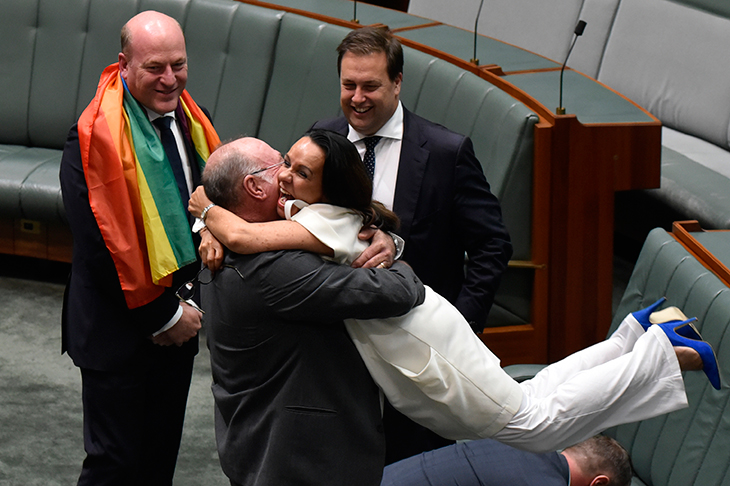The federal parliament used to be a place of vigorous but respectful debate. Not now. I was reflecting on this as I watched Bill Shorten deliver his Budget reply speech. The public gallery was full and it was clear they were all ALP supporters; the gallery must have been booked out as a job lot. Shorten’s speech was punctuated by sustained applause at the end of every sentence, which is out of order under the rules. The Speaker, Tony Smith, should have stopped it, but did not. By the end of the speech, everyone in the gallery leapt to their feet like a tribe of raving banshees and gave Shorten a series of standing ovations complete with screams, clapping, shouting and stamping of feet, which are also out of order. Not that this worried the Speaker, who has form in letting the mob take over the parliament: he allowed the same thing to happen during the debate on same-sex marriage, with supporters of the bill allowed to behave like a wild mob with banners, flags and general uproar.
When I challenged him on this, he replied that the behaviour was ‘parliament at its best.’ Now we have again seen the parliament at its ‘best’ with the tub-thumping around Shorten’s speech. What it means after these two incidents is that from now on, political parties can make mass bookings in the gallery, fill the place with their own crowd and stir up support by a wild public demonstration. Of course, you would not be allowed to behave like this on a bill in support of traditional marriage or against a republic. The parliament, I regret to say, is no longer a chamber for reasoned debate, but an extension of the mob hysteria of the street.
The second incident that marks the decline of the parliament was the censuring of Senator Anning for his comments on Muslim migration into New Zealand. The parliament used to be the place where our elected representatives were free to say what they wished, because the importance of their being able to do so overrode our annoyance or disgust at hearing them say it, no matter how wrong or crazy it might be. Senator Anning probably crossed the line when he said the fact that Muslims ‘…were not the killers in this instance, does not make them blameless.’ This means, logically, that if they were not blameless, they could be blamed in part, and that is going to excess. He should have simply said that if you force-feed an alien culture with a history of violent terrorism into a harmonious society, this may unleash a violent response, albeit from an unsound or unbalanced source. If some senators disagreed with this, they should have had a debate about it, and passed a resolution to that effect. But to censure Anning, meaning that he had no right to express his opinion, is outside the proper role of the parliament. Its role is not to give a hearing to opinions we find palatable and comforting, but to allow all opinions to be aired. That the Liberal party, the great party of liberty, should have joined in this mass stifling of unpopular and unacceptable opinion is the saddest aspect of all.
And what a foolish precedent for the parliament to set; it means that if a majority can be cobbled together to censure one strain of opinion today, a different majority can censure an entirely different opinion tomorrow. That can only intimidate MPs against speaking their minds, which is why they are there. I only hope that Coalition MPs will spare us the hypocrisy of arguing for the abolition of Section 18C of the Racial Discrimination Act when their vote to censure Anning shows they are happy to stifle free speech in the parliament and when their joining in the public crucifixion of Israel Folau shows the same disposition in the public space.
The third threat to the parliament comes from the proposal to embody in the Constitution a separate body composed solely of a certain race, elected solely by the same race, to speak as the official voice of that race and on matters that are of concern solely to that race, namely the Aboriginal race. That is clearly racist because it gives a benefit that can be conferred on people only by reference to their race. It would operate as a third house of a parliamentary structure that has served Australia well; to fracture it now, by setting up a rival and competing body would be a seriously destabilising event.
Moreover, we are told that there is nothing to fear in such a ‘Voice’, as it would only be an advisory body. That is nonsense. If what is needed is an Aboriginal advisory body, we have an endless number of them already, and there would be no need to have one enshrined in the Constitution. Also, can you imagine the result if it gave its advice, but the elected government rejected it? The Voice would be on very good grounds to claim that, as the Constitution gave this power to the Voice, its advice must be followed and, indeed that it could sue the federal and state governments for an order that the advice be followed and implemented. That would be destructive of our entire democratic government. Australians should be aware that this proposal is already underway; the Budget has set money aside to design the form of the Voice, without any decision of the parliament that it should go ahead or be adopted as a matter of principle.This could not have happened unless the government had already decided to support it. Unless the proposal is stopped now, it will go ahead and become a fait accompli. My guess is that, as with same-sex marriage, the Liberal party will be at the forefront of those pushing for it.
Got something to add? Join the discussion and comment below.
Get 10 issues for just $10
Subscribe to The Spectator Australia today for the next 10 magazine issues, plus full online access, for just $10.
You might disagree with half of it, but you’ll enjoy reading all of it. Try your first month for free, then just $2 a week for the remainder of your first year.















Comments
Don't miss out
Join the conversation with other Spectator Australia readers. Subscribe to leave a comment.
SUBSCRIBEAlready a subscriber? Log in